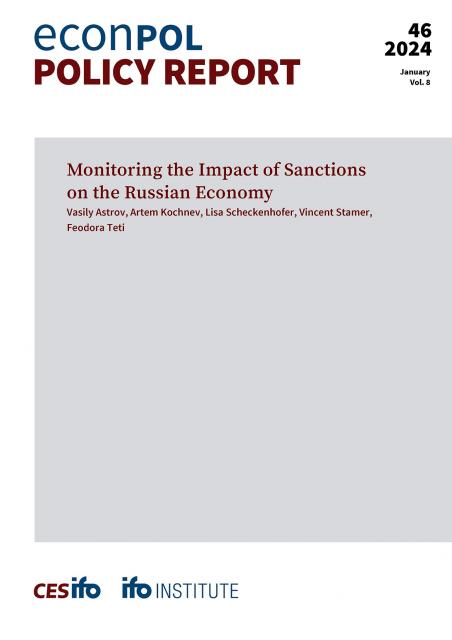Monitoring the Impact of Sanctions on the Russian Economy
Quarterly Report Vol. 1
Despite EU restrictions, only around one-third of pre-war exports to Russia are fully sanctioned; most trade remains unaffected or subject to numerous exemptions. While exports have decreased by 32%, imports have increased by 17% due to innovative ways to bypass trade sanctions. China is Russia’s most important alternative country of origin for products under sanction: 61 percent of all products subject to sanctions come from China. The Russian economy shows signs of recovery, driven by robust domestic demand from wartime fiscal stimulus, contributing about 10% to GDP in 2022-23. Real GDP and industrial production have grown by 2.5% and 3%, respectively, indicating recovery from the economic crisis.
Russia's foreign trade has shifted, causing a 30% depreciation in the Rouble due to declining oil prices and EU embargoes on Russian oil. While exports have decreased by 32%, imports have increased by 17% due to innovative ways to bypass trade sanctions. Despite EU restrictions, only around one-third of pre-war exports to Russia are fully sanctioned; most trade remains unaffected or subject to numerous exemptions. The central bank's rate hikes stabilized the exchange rate, but inflationary pressures persist. The Russian economy shows signs of recovery, driven by robust domestic demand from wartime fiscal stimulus, contributing about 10% to GDP in 2022-23. Real GDP and industrial production have grown by 2.5% and 3%, respectively, indicating recovery from the economic crisis. Sectors benefiting include manufacturing with significant military output, construction, and hospitality. This year's economic growth forecast for Russia is revised upward to 2.3%, but labor shortages and technological setbacks due to Western sanctions pose challenges. The expected slowdown to below 2% in the coming years could result from higher interest rates limiting credit growth. Prolonged conflict may lead to continued reliance on military spending, potentially causing post-war economic stagnation.
Vasily Astrov, Artem Kochnev, Lisa Scheckenhofer, Vincent Stamer, and Feodora Teti: “Monitoring the Impact of Sanctions on the Russian Economy,” EconPol Policy Report 46, January 2024.
